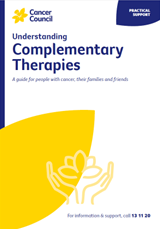- Home
- Peritoneal mesothelioma
- Managing symptoms
- Breathlessness
- Improving breathlessness at home
Improving breathlessness at home
It can be distressing to feel short of breath, but several simple strategies can help provide some relief from breathlessness at home.
Treat other conditionsLet your doctor know if you feel breathless. Conditions such as anaemia, a lung infection or chronic obstructive pulmonary disease may also make you feel short of breath and these can often be treated. | |
Sleep more uprightUse a recliner chair or prop yourself up in bed to help you sleep in a more upright position. An occupational therapist may be able to recommend a special pillow for sleeping. | |
Check if equipment could helpAsk your health care team about equipment to manage breathlessness. You may be able to use an oxygen concentrator at home to deliver oxygen to your lungs. For social outings and medical appointments, you can use a portable oxygen cylinder. If you have a cough or wheeze, you may benefit from a nebuliser, a device that delivers medicine into your lungs. | |
Relax on a pillowRest your head and upper chest on a table with a pillow. Bend from your hips and keep your back straight. This helps to relax your breathing muscles. | |
Ask about medicinesTalk to your doctor about medicines, such as a low dose of morphine, to ease breathlessness. It is important to keep any chest pain well controlled because pain may prevent you from breathing deeply. | |
Modify your movementSome types of gentle exercise can help but check with your doctor first. An exercise physiologist, physiotherapist or occupational therapist from your treatment centre can explain how to modify your activities to improve breathlessness. | |
Create a breezeUse a handheld fan to direct a cool stream of air across your face if you feel short of breath when not exerting yourself. You may also find it helpful to sit b an open window. | |
Find ways to relaxListen to a relaxation recording or learn other ways to relax. This can help you to control anxiety and breathe more easily. Some people find breathing exercises, acupuncture and meditation helpful.Learn more about complementary therapies or listen to the podcast below. |
Meditation and relaxation podcast
Listen to more of our meditation and relaxation podcast for people affected by cancer
All updated content has been clinically reviewed by A/Prof Anthony Linton, Medical Oncologist, Concord Cancer Centre and Concord Repatriation General Hospital, NSW; Dr Naveed Alam, Thoracic Surgeon, St Vincent’s Private Hospital Melbourne and Monash Medical Centre, VIC; Prof David Morris, Peritonectomy Surgeon, St George Hospital and UNSW, NSW. This edition is based on the previous edition, which was reviewed by the following panel: A/Prof Anthony Linton (see above); Dr Naveed Alam, (see above); Donatella Arnoldo, Consumer; Polly Baldwin, 13 11 20 Consultant, Cancer Council SA; Dr Melvin (Wee Loong) Chin, Medical Oncologist, Sir Charles Gairdner Hospital and National Centre for Asbestos Related Diseases, WA; Prof Kwun Fong, Thoracic and Sleep Physician and Director, UQ Thoracic Research Centre, The Prince Charles Hospital, and Professor of Medicine, The University of Queensland, QLD; Vicki Hamilton OAM, Consumer and CEO, Asbestos Council of Victoria/ GARDS Inc., VIC; Dr Susan Harden, Radiation Oncologist, Peter MacCallum Cancer Centre, VIC; Penny Jacomos, Social Worker, Asbestos Diseases Society of South Australia, SA; Prof Brian Le, Director, Parkville Integrated Palliative Care Service, The Royal Melbourne Hospital and Peter MacCallum Cancer Centre, VIC; Lung Cancer Support Nurses, Lung Foundation Australia; Jocelyn McLean, Mesothelioma Support Coordinator, Asbestos Diseases Research Institute, NSW; Prof David Morris (see above); Joanne Oates, Registered Occupational Therapist, Expert Witness in Dust Diseases, and Director, Evaluate, NSW; Chris Sheppard and Adam Barlow, RMB Lawyers.
View the Cancer Council NSW editorial policy.
View all publications or call 13 11 20 for free printed copies.
